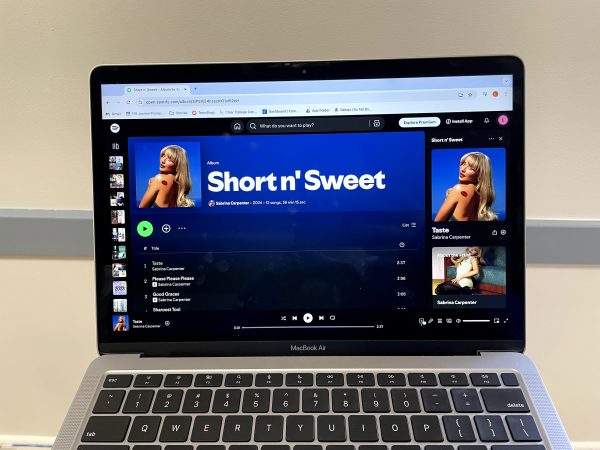Q&A with breast cancer patient: Rebecca Ryan
The Catalyst interviewed Rebecca Ryan, a current patient for treatment of breast cancer.
The Catalyst (TC): When were you diagnosed with breast cancer? What triggered you to go to the doctor?
Rebecca Ryan (RR): I was diagnosed in September of 2021. I was in the shower and felt a small lump in my breast, and called to make an appointment for a mammogram the next day.
TC: In what ways has being diagnosed with breast cancer impacted your life?
RR: It’s changed everything, really. My breast cancer is Stage 4, which is terminal. Right now there isn’t a cure for breast cancer patients who have Stage 4, or metastatic breast cancer. So our lives really permanently change that day, finding that out. My life and our schedule really revolve around my treatment schedule, which will be for the rest of my life. We definitely don’t take anything for granted anymore, and live our lives appreciating every moment we have together.
TC: What kind of treatments are you going through?
RR: My cancer had spread from my breast to my bones – my spine, my shoulders, my hips, the tops of my arms and legs. I started with radiation to my hip, where it was most severe. Then I began 6 rounds of chemotherapy and started immunotherapy. I still have immunotherapy infusions through my chest port every three weeks.
TC: What has been the most challenging aspect of your treatment?
RR: My chest port, probably – I had to get a second one after the first one turned sideways and it wouldn’t work anymore. I have had two port placement surgeries, which took a long time to heal from. And getting the infusions through a port is just painful a lot of times. They need to stick a needle deep into your chest each time, and sometimes it will take the nurse several times to get it right so the drugs can begin flowing. You have to really kind of take your mind off of it, but it’s hard to do because you know it will hurt each time.
TC: Are you a part of a support group? If so, how did you locate this group and has it been beneficial?
RR: I joined a support group called BAYS, or Bay Area Young Survivors. It’s for women 45 and under who have breast cancer in the Bay Area. I am part of a subgroup called Mets in the City, for women who have metastatic, or Stage 4 breast cancer. It’s been beneficial in some ways, just talking with other women who are going through the same thing. But it’s also been hard, because women in our group are all living with a terminal illness and sometimes we will get a message from a loved one that someone in the group has died.
TC: How have you dealt with the mental challenges of breast cancer?
RR: I honestly try not to think about it as much as I can – I don’t want it to define me, or take over my life. I don’t want my identity to be tied up with being a cancer patient, because I don’t want the disease to have that kind of power over me. But that’s hard to do sometimes – to stay positive, to keep it off my mind, when most days I have bone pain, or I’m just tired. You have to really try to live your life as fully as you can for as long as you can, and that means not dwelling on it as much as possible.
TC: What advice would you give to someone else going through breast cancer?
RR: Accept the help that friends and loved ones offer, even if it’s hard and you think you won’t need it. Because you absolutely will need it. Because you absolutely will need it. Be assertive with your doctor to make sure you’re getting the most advanced treatment options you can, and switch doctors if you need to.





